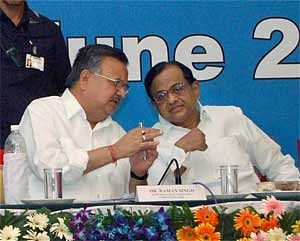

"Most states have barely sufficient capacity to impart basic training to newly-recruited constables. It is often realised that the capacity of the training institutes limits the number of constables that can be recruited in any year in that State.
"...the first order of business is to enhance the capacity of training institutes in the States to at least double the present capacity and to recruit at least double the number of policemen and women that are being recruited, at present, every year," he said while addressing the inaugural function of the 40th All India Police Science Congress here.
Chidambaram also laid emphasis on setting up specialised schools to train the police forces in forensic investigation, detective training, intelligence gathering, and cyber crime.
"States are barely able to recruit the number of policemen and women necessary to fill vacancies that arise due to normal attrition – retirement, resignation, disablement or death.
"How will States be able to add to the net strength of their police forces? Unless capacity is increased manifold, states will not be able to fill the huge number of vacancies – estimated at 3,35,000 – and increase their sanctioned strength," he said. The Minister also praised the efforts of the Chhattisgarh government in dealing with Maoists and offered all possible Central assistance.
Expressing concerned over insufficient policemen and stations, he said, "Inadequate and ill-equipped police forces" makes the task of policing almost formidable."The total number of sanctioned posts as on March 31, 2010, in all ranks, is about 21 lakhs.Of these, about 3,35,000 posts are vacant. Thus, the police-population ratio for the whole country is about 160 per 100,000 persons. This ratio, is much lower than the international norm.
"In a state like Bihar, the number is about 75; in UP it is about 115; in Andhra Pradesh it is about 125; in Orissa it is about 135; in Chhattisgarh and Jharkhand, two States most affected by Left wing extremism, the number is about 205," the Minister said.
Further, the distribution of the police force among the police stations is badly skewed. "There are not enough police stations. Even where there is a police station, the strength of the police force in a station is often no more than 20 persons. In some of the districts most affected by Left wing extremism, the police station exists only in name," he said.
He also stressed on the need of imbibing latest technologies in policing. "Technology can be inducted quickly into functions such as surveillance, communication, data management, inventory management and personnel management"."Advanced technologies are available and can be used for data collation and correlation, data mining, analysis and prediction," he said.
On the occasion, Chhattisgarh Chief Minister Raman Singh said the biggest challenge ahead of police was to curb the Naxal violence and fight against guerrilla warfare.
"We have to face the challenges posed by terrorism and Naxalists with determination," he added.
Besides, police force also needs to get updated with modern techniques, Singh said.
Chhattisgarh had a very small force during its formative years. The State has recruited 25,000 jawans. Apart from increasing the numbers of the force, the needs of the jawans are also being looked after. New police stations are being built, he said.
Special training is being given to jawans at the Jungle Warfare College in Kanker, he added.
Singh said the Salwa Judum movement started against the Naxal movement in Bastar district was not a political or governmental move but an initiative taken by the people itself.
He expressed hope that peace will be restored in the State soon.
The Chief Minister said the police administration will benefit by participating in the All India Police Science Congress as it will give them a chance to interact with the top officials from different states and cities and ideas will be exchanged.